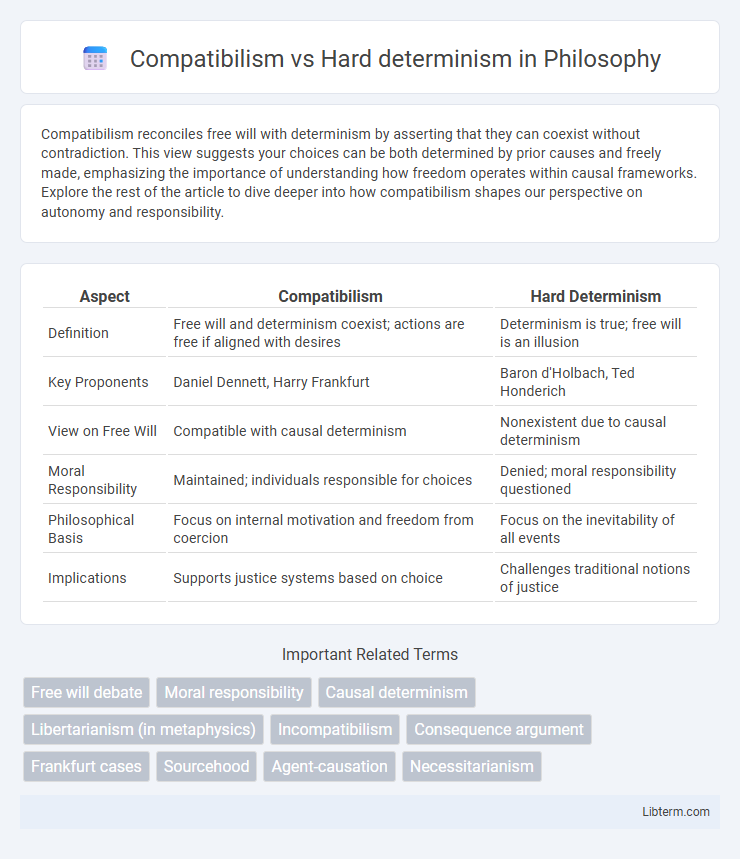Compatibilism reconciles free will with determinism by asserting that they can coexist without contradiction. This view suggests your choices can be both determined by prior causes and freely made, emphasizing the importance of understanding how freedom operates within causal frameworks. Explore the rest of the article to dive deeper into how compatibilism shapes our perspective on autonomy and responsibility.
Table of Comparison
| Aspect | Compatibilism | Hard Determinism |
|---|---|---|
| Definition | Free will and determinism coexist; actions are free if aligned with desires | Determinism is true; free will is an illusion |
| Key Proponents | Daniel Dennett, Harry Frankfurt | Baron d'Holbach, Ted Honderich |
| View on Free Will | Compatible with causal determinism | Nonexistent due to causal determinism |
| Moral Responsibility | Maintained; individuals responsible for choices | Denied; moral responsibility questioned |
| Philosophical Basis | Focus on internal motivation and freedom from coercion | Focus on the inevitability of all events |
| Implications | Supports justice systems based on choice | Challenges traditional notions of justice |
Introduction to Free Will Debate
Compatibilism argues that free will and determinism coexist, asserting that individuals can act freely even within predetermined causal frameworks. Hard determinism rejects the notion of free will, claiming all actions and choices are dictated by prior causes, leaving no room for genuine autonomy. This fundamental divide shapes ongoing philosophical discussions about moral responsibility and human agency.
Defining Compatibilism
Compatibilism defines free will as the ability to act according to one's desires and intentions despite the presence of causal determinism, reconciling moral responsibility with a predetermined universe. It argues that determinism and free will are not mutually exclusive, emphasizing internal states and rationality as key factors for freedom. This philosophical stance contrasts with hard determinism, which denies free will entirely due to the inevitability of causal laws.
What is Hard Determinism?
Hard determinism asserts that every event, including human actions and decisions, is causally determined by preceding events in accordance with natural laws, leaving no room for free will. This philosophical stance holds that free will is an illusion because all choices are predetermined by a chain of prior causes. By denying the existence of genuine free agency, hard determinism contrasts sharply with compatibilism, which attempts to reconcile free will with determinism.
Historical Roots of the Theories
Compatibilism traces its historical roots to the works of Thomas Hobbes and David Hume, who argued that free will can coexist with determinism by redefining freedom as acting according to one's desires without external constraints. Hard determinism emerged prominently from the mechanistic worldview of the 18th and 19th centuries, influenced by thinkers such as Baron d'Holbach, who asserted that every event, including human actions, is causally determined by antecedent states of the universe. The debate reflects longstanding philosophical inquiries into autonomy and causality, grounded in early modern and Enlightenment-era metaphysics.
Core Philosophical Differences
Compatibilism asserts that free will and determinism are compatible, emphasizing that individuals can be morally responsible even if their actions are predetermined by prior causes. Hard determinism, by contrast, denies genuine free will, arguing that every event, including human decisions, is necessitated by preceding events, negating moral responsibility. The core philosophical difference lies in Compatibilism's reinterpretation of freedom as the ability to act according to one's motivations, whereas Hard determinism maintains that such freedom is an illusion under causal determinism.
Moral Responsibility Implications
Compatibilism asserts that moral responsibility remains intact despite deterministic causation, as individuals act according to their desires and rational deliberations. Hard determinism denies free will, therefore negating moral responsibility since actions are pre-determined by prior states of the universe. This debate critically impacts legal systems and ethical theories, influencing how blame, punishment, and praise are assigned.
Criticisms of Compatibilism
Compatibilism faces criticisms primarily for its perceived redefinition of free will, where critics argue it conflates freedom with mere absence of external constraints rather than genuine autonomous choice. Philosophers like Galen Strawson assert that compatibilism fails to address the deeper issue of causal determinism undermining moral responsibility. Furthermore, hard determinists claim compatibilism's emphasis on internal desires does not escape the deterministic framework, rendering its concept of free will illusory.
Challenges Facing Hard Determinism
Hard determinism faces critical challenges centered on its denial of free will, which conflicts with intuitive moral responsibility and legal accountability. Neuroscientific studies reveal complex brain processes that question the simplicity of predetermined actions, complicating the deterministic framework. The inability of hard determinism to accommodate subjective experiences of choice undermines its acceptance in both philosophical and practical domains.
Real-World Applications and Thought Experiments
Compatibilism influences legal systems by supporting the notion of moral responsibility while acknowledging deterministic causation, as seen in rehabilitative justice models. Hard determinism challenges traditional notions of free will in ethics, prompting thought experiments like the Consequence Argument to question accountability. These perspectives shape debates in neuroscience and psychology regarding human behavior prediction and intervention strategies.
Conclusion: Bridging the Divide
Compatibilism and hard determinism diverge primarily on the interpretation of free will and moral responsibility, yet both agree on the causal nature of the universe. Compatibilism redefines free will to align with deterministic principles, asserting that individuals can be morally responsible if their actions stem from internal motivations rather than external constraints. This nuanced understanding offers a bridge by acknowledging determinism's scope while preserving accountability, fostering dialogue across the philosophical divide.
Compatibilism Infographic

 libterm.com
libterm.com